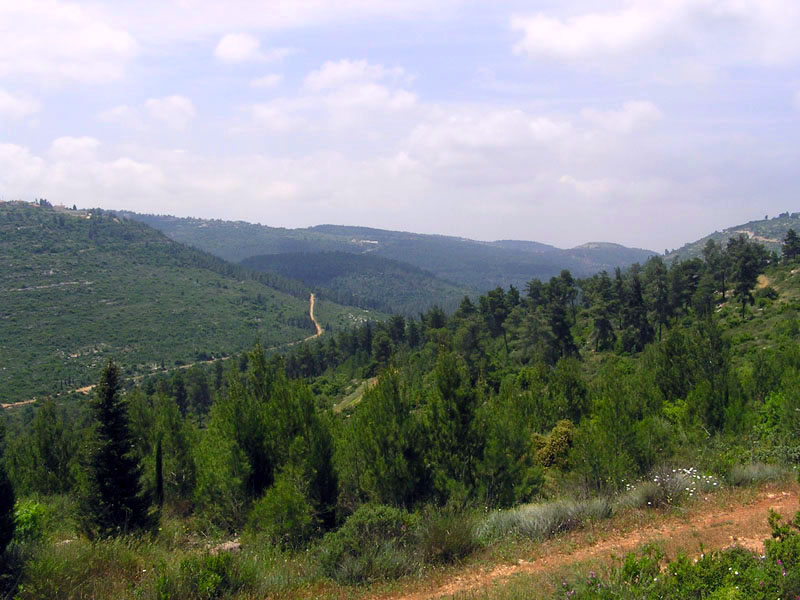Blog
Summaries, Psalms 121-125
Tuesday, November 26, 2019
Psalm 121 is the second in the series of psalms called “songs of ascent”. They were usually sung by Jewish pilgrims who were “going up to Jerusalem”. Even if you’re headed south, going to a mountaintop temple is still going up!
In any case, the psalmist of Psalm 121 is lifting his eyes to the hills he is climbing. He knows that he can seek and find help in God. God will not allow him to fall, and because He doesn’t sleep, His care is constant. God, like a friendly shadow, will keep the psalmist from the glare of the sun and the moon. He will protect him from all evil and will always care for him in his travels.
Psalm 122 is another song of ascents, this one in praise of Jerusalem, the destination. It expresses the psalmist’s delight that he has been invited to travel to Jerusalem. He rejoices because he has been there before and knows what it’s like. God has both established Jerusalem and decreed that the Israelites should go there to worship. Additionally, Jerusalem is the seat of the Davidic kings.
As a result, it is appropriate to pray for the peace of Jerusalem and the security of its inhabitants. Because of them and because the temple is there, the psalmist promises to pray.
Psalm 123 continues the song-of-ascents cycle. Naturally, this is another psalm about lifting up one’s eyes. This time, though, the psalmist is lifting up his eyes not to Jerusalem, but to God. Just like servants watch the hand of their master for indications of his will, so the psalmist will look to God until He has mercy. Indeed, the psalmist pleads for mercy because he is fed up with being held in contempt by proud people.
Psalm 124 (another song of ascents) asks what life without God’s help would be like. Without God, the people of Israel acknowledge that their enemies would have overwhelmed them and carried them off like a flood. As it is, though, God did not give them to their enemies, so they have escaped instead.
Psalm 125 (Song of Ascents #6) is another mountain-centric psalm. It contemplates the immovability of Mount Zion and concludes that people who trust God are equally secure. Indeed, God will keep His people safe like the mountains around Jerusalem keep it safe from invasion. However, His care is not physical, but spiritual. He will protect His people from those who want to tempt them to do evil. The psalm concludes with an appeal to God to bless the upright but punish the wicked.
God's Word Does Not Return Empty
Friday, November 22, 2019
Isaiah 55 is one of the more uplifting chapters in what is a fairly gloomy book. Many Christians are familiar with God’s self-description in vs. 8-9 of the chapter, but vs. 10-11 are also worthy of our attention.
In them, God declares, “For just as rain and snow fall from heaven and do not return there without saturating the earth and making it germinate and sprout, and providing seed to sow and food to eat, so My word that comes from My mouth will not return to Me empty, but it will accomplish what I please and will prosper in what I send it to do.” (CSB)
At first glance, this promise seems strange to Christians. God wants all men to be saved, and He has sent forth the gospel so that they might be. However, we know from experience that not everyone who hears the truth obeys it. In fact, most do not. How can we reconcile these apparently paltry results with the absolute nature of God’s declaration?
The answer, I think, is that we need to take a more complex view of God’s purposes in the gospel. God wants us to be saved, yes, but even more fundamentally than that, He wants us to make a choice. He wants to see whether we will use our free will to seek Him or to reject Him.
The gospel is the means that He uses to compel humankind to make that choice. We can exist in a spiritual no-man’s-land until we hear the word, but once we do, our reaction reveals what kind of people we are. Either we have chosen to obey, and that will be obvious, or we have chosen to rebel, and that will be equally obvious.
Sometimes, in fact, God uses His word primarily to drive the wicked out into the open. This is especially obvious in the book of Jeremiah. In Jeremiah 18:11-12 (and many other such places), God instructs Jeremiah to warn His people while simultaneously predicting that they will not listen. He does this to mark them as His enemies and to deprive them of any claim that He is being unjust in destroying them.
Certainly, we should present the word to sinners as persuasively as we can. However, when they harden their hearts against it, we should not feel like we have failed. We have done what God intended for us to do, just as His word has done what He intended it to do.
His purpose is worked out in the salvation of the humble, but it also is worked out in the destruction of the proud. As His word left the wicked people of Jeremiah’s day without excuse and ripe for judgment, it leaves the wicked people of our day without excuse and ripe for judgment. Everybody who hears His word will glorify Him. The only question is whether His glory will come from redeeming us or putting us to everlasting shame.
Singing and the Presence of God
Thursday, November 21, 2019
The other day, I ran across a blog post online entitled, “Is Your Church Worship More Pagan Than Christian?” I said to myself, “Hmm. That sounds like the sort of thing I might agree with,” so I clicked on it. I did not agree with it.
The thesis of the post, to quote the author, is that “Music is viewed as a means to facilitate an encounter with God; it will move us closer to God. In this schema, music becomes a means of mediation between God and man. But this idea is closer to ecstatic pagan practices than to Christian worship.” In other words, if we regard singing as a way to experience the presence of God, we’re thinking unbiblically.
I disagree. There are many Scriptural texts that link worship and encountering God. As Psalm 100 urges, “Come into His presence with singing! . . . Enter His gates with thanksgiving and His courts with praise!” Certainly, this refers in part to entering the grounds of the physical temple in Jerusalem. However, the Israelites knew very well that God didn’t live in a box. They regarded the temple as a special point of access to His actual presence in heaven, and they worshiped in order to come into that presence.
Today, we worship God neither on Jerusalem nor on Mt. Gerizim. Instead, we worship in spirit and truth. God’s attention is no longer focused on the temple. Instead, wherever His people gather, He is in their midst. Our song worship is supposed to be a celebration of His presence. If we aren’t emotionally moved by the knowledge that God is with us and is accepting our worship, we aren’t doing it right.
Now, I do agree that many of the harms that the author lists are problems. No, we shouldn’t marginalize the Bible in favor of worship. No, we shouldn’t base our relationship with Him on emotion rather than truth. No, we shouldn’t exalt our worship leaders above their brethren. No, we shouldn’t divide over worship styles.
All of those things are wrong, but none of them are a result of desiring to encounter God through song worship. They’re the result of other spiritual problems that are contaminating worship too. If we try to make worship something other than a way to encounter God, we won’t solve those problems. Instead, we’ll create new ones.
Indeed, I believe that such problems are prominently on display in churches around the country. Every congregation that numbly goes through the motions on Sunday morning, every congregation that approaches song worship with the enthusiasm appropriate to a trip to the dentist, is a congregation that has forgotten the reality of the presence of God. Such churches may comfort themselves with the conviction that they have “done the right thing” (“Act of Worship #2—check!”), but in truth, they’ve only offered a Malachi 1 counterfeit.
The last thing that they need is increased suspicion of emotion in worship! Rather, what all of us need to increase is our willingness to pour ourselves out before the Lord, to rejoice in the knowledge that He is with us. Certainly, emotional worship can be wrong, but emotionless worship can’t be right.
Gene Editing and God
Tuesday, November 19, 2019
While most of us have been paying attention to sports and the political drama in Washington, a quiet medical revolution has been taking place. Since the sequencing of the human genome about 20 years ago, medical researchers have been using this newfound understanding to develop treatments for genetic disorders. These treatments employ what is known as gene editing. Gene editing involves the use of a virus or some other vector to remove a harmful mutation from a patient’s DNA and replace it with genes that will function correctly.
As abstract as this sounds, its consequences have been profound. This year alone, the FDA has approved genetic therapies for spinal muscular atrophy and cystic fibrosis. I know Christians whose children suffer from these afflictions. They are burdened both with the care of a medically fragile child (which is far more time-consuming and expensive than most of us can imagine) and, often, with the knowledge that their child’s disorder will lead to premature death. For those in such a position, the appearance of these transformative therapies must seem like a miraculous dawn of hope.
However, some brethren are uneasy with the moral and spiritual implications of genetic editing. Once we start monkeying around with DNA, haven’t we trespassed into areas that properly belong to God? Aren’t we defying His will? Also, how do we draw the line between genetic editing for these reasons and genetic editing for any reason? What’s the difference between curing SMA and creating a future NBA All-Star?
To answer these questions, I think we must consider the events of the first three chapters of Genesis. When God created Adam, he held within his seed the potential to give the vast diversity of mankind that we see across the globe. Every race, every individual difference, all of those things were part of God’s original intent. He saw all of them and pronounced them good. I will never be an NBA All-Star, but I still reflect God’s plan for mankind.
However, genetic disorders appear on the scene not in Genesis 1, but in Genesis 3. They are part of the curse that Adam’s sin invited. We die not because our deaths please Him and fulfill His will, but because our rebellion left Him with no other choice. If the wickedness of Adam’s first, long-lived, descendants was so great that God had to destroy the world with water, how wicked would we become with an eternity to perfect our wickedness?
I am skeptical of efforts to do a better job with God’s creation than He did, but I see no problem with fighting against sickness. Ultimately, such efforts will prove vain. Even children who have been relieved from the burden of genetic illness will someday die. However, if resisting the great enemy of humankind is wrong, then Jesus Himself was wrong. How many hopeless people did He heal?
Certainly, the technology used in genetic therapy can be abused, but I believe that the therapies themselves are something to celebrate. In this fallen world, even the innocent often suffer, but when we use understanding and skill to relieve their suffering, it is a godly act. I rejoice in the hope that genetic therapy offers to Jayden and Abigail and Sam and their families, as well as to many others whom I do not know. This is a new kind of healing, but it still comes from the One who gives all healing.
Summaries, Psalm 119:113-Psalm 120
Monday, November 18, 2019
Psalm 119:113-120 (Samekh) shows more concern for the antics of evildoers. They anger the psalmist and he wants them to go away because he knows they also anger God. By contrast, the psalmist fears God’s word and trusts His promises.
Psalm 119:121-128 (Ayin) again reflects the psalmist’s concern for what is going to happen to him. He asks for protection from his enemies, the fulfillment of God’s promises, God’s love, greater understanding, and vindication. He compares the crookedness of the wicked to the uprightness of God’s law.
Psalm 119:129-136 (Pe) describes the glories of the word and the psalmist’s longing for them. He yearns for the commandments, and he wants God to be gracious to him because of his commitment to the law. To him, God’s word and God’s blessing go hand in hand.
Psalm 119:137-144 (Tsadhe) returns to the theme of the word’s perfection. God’s statutes have been established by Him, His promises have been tested and found to be true, and His law will always reveal what is righteous. Because of this, the psalmist is confident that through understanding them, he will live.
Psalm 119:145-152 (Qoph) reveals the psalmist’s behavior in trouble. He calls to God to rescue him, even rising before dawn to do so. Through the night, he continues to reflect on the word. As a result, he asks God to protect him from the wicked (who are far from the law), because of God’s nearness to the righteous.
Psalm 119:153-160 (Resh) reports the psalmist’s attitude toward God’s law and those who violate it. He remembers the law and God’s promise. Despite his many enemies, he continues to hold to it, and he regards those who do not with contempt. Ultimately, his hope is in the word.
Psalm 119:161-168 (Sin and Shin) presents the psalmist’s focus on the law. Even though powerful people are persecuting him, he gives it his attention. He rejoices at it and praises God for it. Because of his love for God’s testimonies, he obeys them.
Psalm 119:169-176 (Taw) contains the psalmist’s promise of faithfulness if God rescues him. He wants both deliverance from his enemies and greater understanding of the word. Because of his faithfulness, he asks God’s help, and he promises to praise Him and to continue to remember His commandments if he receives that help.
Psalm 120 is written from the perspective of an exile. He begins by praising God for His past help, and he then asks God to rescue him from people who are lying about him. He expresses the wish that the tongues of the liars will be pierced with arrows and burned with hot coals. In the meantime, the psalmist is stuck in Meshech, amid the tents of Kedar (basically, in the deserts of modern-day Iraq). Even though he wants peace, he’s surrounded by warmongers.


